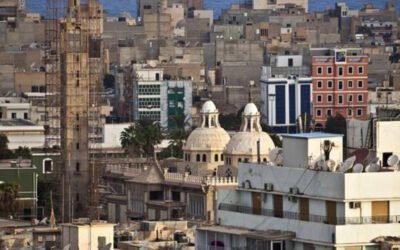
The Libyan Banking Sector: A Microcosm of Global Enduring Disorder
Jason Pack and Stefano Marcuzzi argue that Libya’s CBL is a microcosm of our era of Global Enduring Disorder.

Libya’s implosion: the cascading effects of the 2012 killings in Benghazi
The notion that American policies throughout the Middle East failed as a result of the US's engagement with Islamist actors' is incorrect.

Power struggle over oil threatens Libya's fragile transition process
Oil production shutdowns are increasingly likely as several players in the sector push their own agenda.

A Trumpian Peace Deal in Libya?
Surprising as it may be stateside, U.S. President-elect Donald Trump is wildly popular in Libya, and Tripoli needs an unorthodox approach.

The ‘other’ negotiations: UN progress in Libya and the west’s next move
Despite flaws, the Libyan deal represent a significant achievement. A mediated settlement was the only way to prevent further military escalation.

Miliband’s position on Libya is deeply hypocritical
While Miliband is right to point out that Libya would have fared better had the Western administered more capacity-building assistance after Qadhafi’s fall, his speech writers haven't studied the history of Western involvement in Libya enough.

How to End Libya’s War
The war in Libya is not about religion or ideology; it is about greed and vengeance. By not lending our tacit support to either side we could remove the poisonous injections of cash and weapons that drive the conflict.

Libyans Need Help Standing Up to Extremists
There is no appetite among Libyans for foreign peacekeepers. But there needs to be a more visible and substantive multilateral commitment to Libya.

Talk About Political Dysfunction
Libya’s leadership must put an end to the militias’ mythology by finally defending itself in the court of public opinion.

Why Libya Is So Hard to Govern
Inter-group squabbling reigns as the country stalls on drafting its new constitution.

Another missed opportunity on Benghazi
Given the state of misunderstanding of Libyan realities on the Hill, it is unsurprising that Congress seeks to treat the new Libyan government as untrustworthy partners and therefore seek to securitize our bilateral relationship.

Libya: Two Years Later
Libyans want to put the Qadhafi era behind them, but they also want capable individuals to draft the constitution, keep the lights on and the oil flowing. To achieve this they need a strong, moderate leadership.

The importance of stabilising Libya
At present, Libya’s new central government is so weak that swaths of the country are ungoverned space. Since multilateral engagement won the war, it is now time to reconstitute the coalition to win the peace.

Engagement in Libya was and remains the right answer
Libya should be held up as a poster child for a Western diplomacy that seriously engages with Muslim populations rather than just propping up their dictators.

Amid Chants of ‘Free Libya, Terrorists Out,’ a Nation at a Crossroads
Spontaneous street demonstrations denouncing the attack in Benghazi sought to pressure the government to act against its perpetrators, suggesting that Libyans are determined to build an inclusive society free from fear.

Honouring Chris Stevens
How the US ambassador killed this week in Benghazi would have handled Libya.

Post-Gaddafi Libya should think local
After a revolution that started at the periphery, Libya must empower local networks while avoiding factionalism